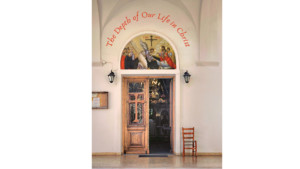The Depth of Our Life in Christ

Yesterday I was crucified with Him; today I am glorified with Him; yesterday I died with Him; today I am made alive with Him; yesterday I was buried with Him; today I rise with Him.
Having prepared ourselves during Great Lent in accordance with our Orthodox Church’s prescribed custom of prayer, fasting, spiritual readings, partaking in the sacraments, and attending as many church services as possible, we arrived at Palm Sunday, being at the beginning of the Passion of our Lord and Saviour Jesus Christ.
Hopefully we lived Holy Week with considerable contrition for the suffering of our Lord for the sins of each one of us, and arrived at the glorious day of His Resurrection, Pascha! The word is Jewish, and means passage, redemption, salvation. These three words indicate that we passed from the dominion of the devil, sin and death, into the freedom of the children of God (Romans 6:20).
It is a great blessing of God for a person to be a Christian, and at that, an Orthodox Christian. But such a blessing presupposes certain obligations and duties of ourselves towards our God, namely worship, repentance, and confession.
1.Worship of God is a most important obligation, especially during the Holy Liturgy which we should attend every Sunday, and where possible on week days. It is important to be present in Church during the Holy Liturgy and to take part in it. This means praying with the Priests and the Chanters the prayers that they are offering to God. In so doing, and in partaking in the offering of the Holy Eucharist, we receive the blessings of Jesus Christ which fill our hearts with divine peace and spiritual joy. It was Jesus Himself who instituted the Sacrament of the Holy Eucharist by saying to His Disciples, ‘Take, eat; this is My Body… Take, drink; this is My Blood of the new covenant, which is shed for many’ (Mark 14: 22, 24).
The worship of God implies a deeper understanding of the significance of the prayers and actions that take place during worship. During the ‘Holy Anaphora’, which follows the Creed, the Holy Gifts are offered to God. The prayer at one point says, ‘We further offer to You, this spiritual (logical, rational) worship…’ This means that we should have a clear and full understanding of what happens at this point, and at every point of the Holy Liturgy. This understanding is a task and duty of every Orthodox Christian, and it should be done at home by reading relevant books that explain the meaning and significance of every detail during worship.
Also, if we have questions we should ask them of our local priest, our confessor, or a Christian friend. Whenever such questions arise they must be resolved as quickly as possible, to avoid uncertainty about our spiritual life.
Worship is not only focused on the Holy or Presanctified Liturgy, but also Vespers, the Paraclesis and Salutations to the Theotokos, Paraclesis to various Saints, and other individual prayers.
- Repentance and Confession. Our Lord and Saviour Jesus Christ died on the Cross so that the sins of all – of past, present and future – may be forgiven. This forgiveness will happen if the person repents (i.e. recants for their previous sinful life, seeks forgiveness for their sins) and confesses them to a priest confessor of the Church.
This sacrament is the ultimate expression of the Love of our God for humanity. The person is relieved of their feelings of guilt and their disturbed conscience, whilst their new state of freedom from their past restores them to the position similar to that of an infant following baptism. This is why various Fathers of the Church have called confession the second baptism. The sacrament of confession was established by our Lord Himself when He appeared to the disciples after His resurrection. He breathed onto them and said: ‘If you forgive the sins of anyone, they are forgiven; If you retain the sins of anyone, they are retained’ (John 20: 22-23).
The person who repents and confesses their sins enters into a new life in Jesus Christ, who will be with them for evermore.
Χριστός Ανέστη!
Source: Lychnos April 2022 /May 2022
